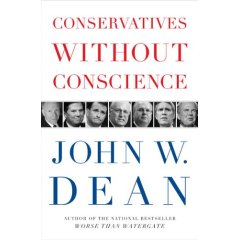
Saturday, October 28, 2006
What's This About: Conservatives Without Conscience by John W. Dean

John W. Dean, White House legal counsel to President Nixon, during the Watergate era, and author of numerous best sellers since then, wrote a book published in July 2006, entitled Conservatives Without Conscience.
What does this book say?
Dean believes the conservative movement that has come to dominate American politics in the past 20 years is much different from traditional conservatism, as well as the conservative movement of the 1960's and 70's embodied by Barry Goldwater.
Traditional conservatism, according to Dean, was cautious, defended the staus quo, believed change should occur incrementally and gradually, and was averse to dramatic social upheavals. Dean believes the modern conservative movement departs from traditional conservatism by embracing radical means and adopting drastic measures to achieve the goal of restoring what they perceive as America's cultural traditions.
According to Dean, Goldwater's conservatism emphasized libertarianism, fiscal responsibility, civil rights, and equality. In contrast, Dean claims modern conservatives are moralists and spendthrifts who want to see government regulate private conduct and curb civil liberties.
Much of Dean's book appears to be devoted to elaborating on what he believes to be the psychological profile of modern conservatives, both the followers and the leaders. According to Dean, forty years of psychological data and sociological studies suggest that people who identify themselves as conservatives do so because they have "a heightened psychological need to manage uncertainty and threat." Among the psychological characterisitics associated with political conservatives are: high levels of fear, an aversion to ambiguity, overreaction to threats, an inordinate need for structure and a strong desire to dominate others. Dean claims this constellation of traits is not normally correlated with liberals.
Dean draws on the work of linguist George Lakoff, whom Dean cites for the proposition that different models of the "ideal family" drive conservatives and liberals. According to Dean, Lakoff believes that liberals are unconsciously shaped by what he calls the Nurturant Parenting model, which emphasizes traits such as equality, empathy, and understanding, while conservatives are shaped by the Strict Father parenting style, which emphasizes obedience, discipline, and following rules, and engenders a reverence for authority figures as being necessary to stand up to and defeat evil in a highly dangerous world.
Research shows, claims Dean, that "authoritarianism is consistently associated with right-wing but not left-wing ideology." Dean cites scientist Bob Altemeyer as having developed the Right Wing Authoritarianism (RWA) scale, under which the following criteria are used to identify the authoritarian personality type:
The Followers:
- Submissive to authority - accept without criticism the statements and actions of authority figures (parents, political leaders, police, and religious figures). Are intolerant when such figures are criticized.
- Aggressive support of authority - easily accept aggression sanctioned by authority figures.
- Conventionality - accept follow, and defend the traditional norms of society. Often tend toward fundamentalism in religious matters.
The RWA scale is useful for identifying followers, but is far less useful for identifying authoritarian leaders. For this, says Dean, scientists have developed the Social Dominance Orientation (SDO) theory.
The Leaders:
- Control and command - seize every opportunity to lead and enjoy having power over others.
- Inequality is inevitable - social dominators believe some people are just more worthy than others.
- Rough world - social dominance orientation emphasizes traits like toughness, hardness, and ruthlessness as opposed to compassion, altruism, and caring.
According to Dean, social dominators exhibit little moral restraint; for them, there is no right and wrong, only what you can get away with. As a result, they tend to be highly manipulative. Authoritarian followers are especially likely to trust someone who tells them what they want to hear. Social dominators are very adept at spinning stories they believe will get them what they want from followers. Thus, the two groups form a mutually reinforcing dyad.
Dean acknowledges that not all conservatives are authoritarians. Nevertheless, Dean contends that most authoritarians are conservative.
Dean believes that only recently has authoritarian conservatism gained widespread acceptance in American political life, threatening libertarian and traditional thinking. According to Dean, Bush and Cheney have used 9/11 as an excuse to enact their authoritarian tendencies. Bush has claimed extraordinary powers and the right to conduct executive activities in total secrecy and without accountability - all hallmarks of authoritarian thinking - but the results have not been greater success in the war on terror. Rather, authoritarianism and secrecy have bred incompetence. Perversely, the dangers that flow from incompetence are often cited as proof that the authoritarian leader requires even greater powers.
Dean asserts that Bush and Cheney, in contrast to other American leaders, have made fear mongering standard operating procedure. But fear mongering takes reason out of the decision making process, which history shows is a dangerous route to take.
Dean believes authoritarianism carries many risks. First, it is a precursor to fascism. Second, it isolates the ruling class in unhealthy ways. Finally, authoritarian personalities in government will seek to eliminate checks and balances intended to function as error-correcting mechanisms. Left unchecked, the authoritarian conservative movement may dismantle our democratic system of government.
 Stumble It!
Stumble It!